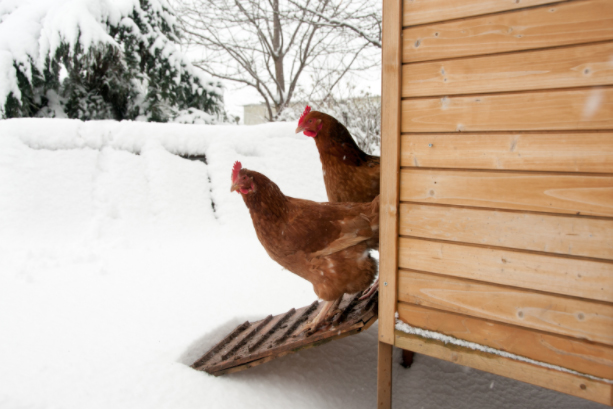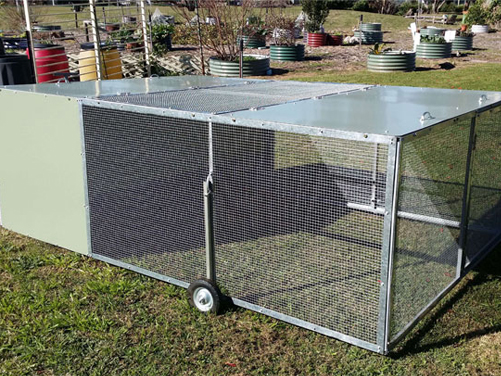How to manage chickens in winter

If you are from Australia, then you are in luck. Winters in Australia are quite mild compared to the blizzards and chilly snowfall that some chicken keepers face around the world. In many parts of Australia, the worst winters day is equivalent to the best summers day in cities like London. This being said, there are many parts of Australia like the ACT, western parts of NSW and Tasmania that can get quite frosty at times.
No matter where you live, it is essential to protect your flock from the cold. This becomes even more important in the event of a sudden temperature drop. Let’s take a look at what you can do to keep our girls warm this winter.
Your chickens are tougher than they look!
Chooks are a lot tougher than you might think. They’re cute, fluffy and cuddly, but that doesn’t mean they can’t withstand a little bit of cold and some tough conditions. It is important for chicken keepers to look at winter from their chickens’ point of view and not just their own.
Chickens adapt to winter conditions very differently from humans. To you going outside into the chilly morning might seem worrisome, but to your chickens that is their favourite foraging time. It might go against all your instincts to let them out into the cold, but they are quite comfortable.
If possible, or unless weather conditions are very extreme, avoid moving your flock indoors unnecessarily just because you are cold. Observe their behaviours to see how comfortable they are and let them be if they don’t huddle together or refuse to leave the coop.
A Chicken’s Winter Enemies
In summer, water is your friend, but in winter excess moisture and humidity can cause major damage to your flock. Water is used to cool down your chicken’s so you can imagine the devastation in winter when trying to keep them warm. Excess moisture can lead to frozen toes, combs and many sick chickens due to the chill.
Keeping your coop dry in winter is vital to your flock’s survival. To avoid a wet coop, look out for the following:
- Spilt Waterers
Keeping your waterers in the coop might seem like a great idea to keep them from freezing over, but your girl might also accidentally knock them over. It is better to keep waterers in a sheltered outside location to keep your coop dry.
- Rain And Snow
Rain and snow will lead to a buildup of moisture in your coop if you have a leaking roof. If you find any leaks, make sure to fix them as soon as possible. At the same time, however, you will need to make sure that your coop is still well ventilated. Ventilations prevents a bunch of problems in both winter and summer. Your ventilation shafts and holes should be placed in such a way that they prevent drafts and moisture from entering, but still allow your coop to breath.
- Air Tight Coops
It is an instinct for most of us to try to close up the coop in winter to try and keep our chickens warm, but doing so actually has the opposite effect. An airtight coop will often result in excess humidity and moisture build-up inside the coop. This will lead to a drop in temperature instead of heating it up. Ventilation is key to prevent this problem. Good ventilation is essential in both summer and winter even though it might seem counterproductive.
- Too Much Poop
Too much poop is, of course, never a good thing, but it can be particularly dangerous in winter. Chicken manure contains a lot of water which, again, can lead to wet conditions in your coop. It is best to clean out your coop regularly to prevent this problem. You can also switch to highly absorbent bedding such as hemp. If your coop has easy-to-clean trays, it will make your life much easier to keep your chickens dry.
Preventing moisture build up in your coop is essential to keep your chickens healthy and warm throughout winter. Always keep an eye out for any condensation in the coop which is an indicator of excess moisture.
Artificial Ways To Keeping Your Flock Warm
There certainly are artificial ways of keeping your flock warm, but there is a lot of debate around the practice. Some feel that a chicken should keep itself warm because it is better for its health in the long run. Here are some popular artificial options, but we will let you decide if it is the right choice for your flock:
- Heaters
Electronic heaters are a very popular and practical choice for increasing the temperature inside your coop, but they can pose a number of problems. Heaters can be a fire risk and produce artificial light.
The artificial light will encourage more laying during winter, but just because that is great for you, doesn’t mean that it is for your flock. Chickens need a break from laying to recover every now and again, so forcing them to lay with artificial light might lead to earlier chicken death.
- Wind Breaks
Some chicken keepers construct makeshift windbreaks around their coop and chicken runs. In a way, this is like creating a cold frame but for your chickens instead of your garden. Just keep in mind that ventilation is crucial since your chickens need to still be able to breathe! This can be a DIY project if you have a little experience with building, so worth a shot to keep your chooks warm.
- Insulation
Properly insulating your coop can be quite a challenge. For yourself, the plan would be to seal the area and line the ceiling with popular insulation materials, but it’s not that simple for chickens. Chickens need ventilation both in winter and in summer to stay healthy.
You will need to insulate your coop in a way that there is airflow, but no drafts. You will also need to keep in mind that chickens are curious creatures. If any of your insulation material is exposed, they might try to eat it. Despite all the challenges, it is still doable and worth a try.
These are all great artificial ways of keeping your flock warm. There are, however, a number of natural solutions to keep your flock warm as well.
How To Keep Your Chickens Warm Naturally
It might seem hard to keep your flock warm naturally, but it really doesn’t have to be. You don’t even really need to do that much to keep them warm. Chickens have a number of innate abilities and behaviours that are designed to help them fight the cold.
There are a number of things you can do, however, to help your chickens not freeze their combs off! Let’s take a look at what chickens do to stay warm, and how you can help:
- A deep litter system
A deep litter system is one of the easiest and most natural ways to keep your chooks warm. A deep litter system will naturally break down old bedding, eradicate foul chicken poop odours as well as act as warm bedding. There are a number of things you need to know to keep a deep litter system, so make sure to read up and expand your knowledge before you try it!
- One-Legged Chicken
Chickens will lift up their one leg to warm it up in their plumage. In the winter months, you may notice that your flock often stands on one leg quite often. Don’t worry, they didn’t suddenly all injure their legs, it is a strategy for staying warm in the coldest months.
- Huddling Together
Keeping more than one chicken is a clever way to keep your chooks warm. Chickens will roost close together and fluff up their feathers to create a nice little huddle of body heat. The more chooks you have, the more body heat can be created in the coop. This is the best way to keep your chickens warm naturally.
- Feed Them Something Warm
Chickens, just like us, like to eat something warm on a cold winter’s day. Chickens love a bit of oats pap every now and then on particularly cold days. Chickens can also raise their core body temperature by eating more. Feed your girls some extra grain and other healthy snacks to help them stay warm. Try not to make them too fat with pasta, rice and other unhealthy snacks!
- Fruit and vegetable pinatas
Cabbage or some piece of fruit tied to a strict is a great way to keep your hens both warm and entertained. A swinging piece of vegetable or fruit will keep your girls moving and active which, in turn, helps them to stay warm. The extra food will also help to raise their core temperatures which will keep them warm at night.
At the end of the day, customizing your coop to withstand weather extremes is always a good idea. This is best done from an informed position, however. There are many factors you might not have thought about that could negatively affect your flock.
Having a structurally sound, well-ventilated coop will resolve most of your problems. It is always best to keep your girls warm naturally if possible with a deep litter system or using their natural inclinations before implementing artificial devices. It is best if you know and understand what to expect from winter conditions in your area, as well as how your particular breed of chicken reacts to the cold. Having this knowledge should help you to keep your chooks safe throughout the cold season.

McCallum Made Chicken Tractors are mobile and strong, and waether-proof
Our mobile chicken coop partner with it canvass cover is suitable fro your poultry and small animals during the winter.


